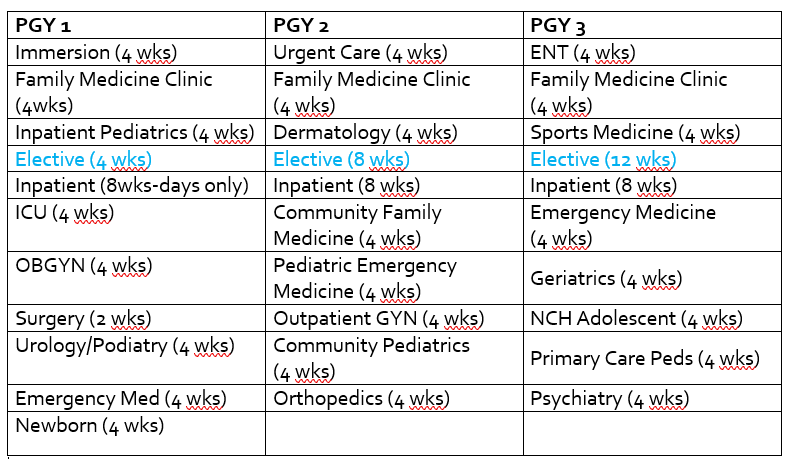Rotation Schedules
Below are examples of rotation schedules for each PGY level.
Highlights:
PGY 1
Immersion block: provides the opportunity to acclimate to clinic operations and build relationships with their colleagues during the first month of intern year
Pediatric experiences: Newborn rotation in the nursery at Doctors Hospital, Inpatient pediatrics at Nationwide Children’s Hospital, longitudinal pediatrics and pediatric OMT clinic at DHFP
Continuity clinic: 6 weeks of dedicated clinic plus continuity time throughout other blocks helps support development of individual patient panels
Outpatient-focused surgical experiences
1 elective block
PGY 2
2 elective blocks to explore specific interests
Pediatric emergency rotation offers a robust experience at Nationwide Children’s Hospital
Urgent care rotation allows for development of acute care skills and efficiency of practice
Community medicine rotation provides concentrated experience to explore social determinants of health and serve on Wellness on Wheels (WOW)*
* Residents also have the opportunity to apply for the PGY 3 position of WOW resident, who will see continuity patients through WOW throughout the year.
PGY 3
3 elective blocks to further explore specific interests
Adolescent pediatrics rotation presents opportunities to treat adolescents and gain further experience in gynecological procedures, care of LGBTQ+ patients, and management of early adult psychiatric conditions
Emergency medicine rotation provides more experience treating common lower acuity diagnoses often encountered in urgent care settings
Osteopathic curriculum
Our foundation is in osteopathic medicine, and we have been practicing it for over 40 years! Our program is affiliated with one of the largest osteopathic training sites in the United States. Osteopathic Principles and Practice (OPP) and Osteopathic Manipulative Medicine (OMM) are taught in the hospital setting, ambulatory clinic, and in didactics through the following learning opportunities:
Multiple dedicated OMT clinics, including pediatric OMT clinics (with an osteopathic pediatrician!)
Inpatient osteopathic rounds on the family medicine service twice monthly
OMT didactic lab each block
Includes collaborative OMT labs with other residency programs
Pediatric OMT labs with pediatric patient volunteers
Osteopathic preceptor always available in clinic to support residents at every skill level
OMT is integrated into visits throughout our day-to-day continuity clinic
OPP Grand Rounds at Doctors Hospital once per month
Associate Wellness Clinic at Doctors Hospital: additional supervised training in OMT
Annual baseline OMT skills assessment and personalized osteopathic learning plan: an opportunity to identify strengths and opportunities for growth for each resident
DIDACTICS HIGHLIGHTS
The didactics schedule is modified annually to strike a balance among diverse learning styles, patients’ needs, residents’ interests. and ACGME requirements. Below is a sample list of topics.
Highlights:
Facilitated Healthcare Disparities sessions occur throughout the year and allow reflective discussion among residents and faculty to make meaningful change toward a more inclusive practice/office.
A variety of topics are chosen to address the healthcare needs of a diverse patient population while also preparing our residents for successful completion of their board examination
The Clinical Pharmacist serves as a topic expert to address specific conditions/medication management topics
The pairing of OMT and musculoskeletal workshops allows for seamless integration of a learner’s skills into practical application
Opportunities are given for leadership development of all residents
Collaborative Point of Care Ultrasound (POCUS) workshops, procedure labs, and access to SonoSim simulated ultrasound program offer opportunities for our residents to gain and practice skills in using ultrasound.
Sample Didactic Lecture topics
Healthcare Disparities
Mitigation strategies to address implicit bias
Substance Use Disorders: Social stigma
CLAS in Healthcare
Central Ohio Charitable Pharmacy: improving access to prescription medications
Breaking down the “isms”
Sexual Health
Contraceptives
HRT and Menopause
Hepatitis C evaluation and management
Supporting LGBTQ+ patients
PrEP/HIV education/counseling
Gender affirming care/treatment
HPV and Cervical disease screening and management
Cardiology
Atrial fibrillation evaluation and management
Heart failure updates
Management of Common dysrhythmias
Primary and secondary CVD risk reduction
Community Medicine
Population Health Assessment
Endocrinology
Diabetes management: Insulin / Non-insulin
Thyroid Disorders: Evaluation and Management
Gastroenterology
Epigastric Pain
Peptic Ulcer Disease
Irritable bowel disease and Inflammatory Bowel Disease
Colon cancer screening
Geriatrics
Geriatrics- Falls
Geriatric Medication Management
Pressure ulcer management
Neurology
CVA Evaluation and Management
Headaches
MS for Primary Care
Other Neuroimmunology conditions
Syncope Evaluation and Management
Pediatrics
Pediatric Acute Abdominal Pain
Pediatric Diarrhea and Constipation
Pediatric exanthems
Well Child Care
Febrile neonate
Personal development
Managing your personal finances
Personal Wellness Strategies
Pulmonology
Pneumonia Evaluation and Management
Acute Asthma Management
COPD Management
Psychiatry
Management of anxiety / depression
ADHD management
Sleep disorders
Rheumatology
Osteoporosis
Fibromyalgia
Back Pain
Urology
Prostate Disorders and Cancers








